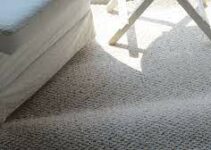Carpet is a popular flooring choice for many reasons. One of the most common questions people have about carpets is whether or not they can absorb sound. In this post, we’ll explore the answer to that question.
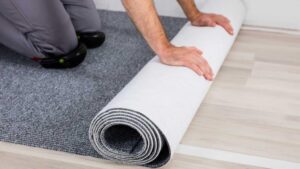
Does carpet absorb sound
And this article Discoverthedinosaurs.com will help you answer the following questions about does carpet absorb sound:
- does carpet absorb sound from neighbours
- does carpet pad absorb sound
- carpet sound absorption coefficient
- soundproof carpet
- carpet acoustic rating
- sound carpet
- sound absorbing rug
- does carpet underlay reduce noise
What Does Carpet Absorb Sound Like?
Carpet absorbs sound in a number of ways. The most common way is through the fibers themselves. When sound waves hit the carpet, they are scattered and absorbed by the individual fibers.
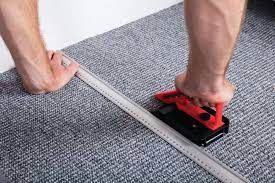
What Does Carpet Absorb Sound Like
This means that the higher pitched sounds are absorbed more than lower pitched sounds. Additionally, because carpets have many layers of fiber, it can absorb large amounts of sound. This is why it can be difficult to hear footsteps on a carpeted floor compared to hardwood or tile floors.
How Does Sound Absorption Work? Does Carpet Absorb Sound?
Carpet absorbs sound because of its fibers and padding. The padding acts as a acoustic sponge, trapping sound waves and preventing them from traveling through the carpet.
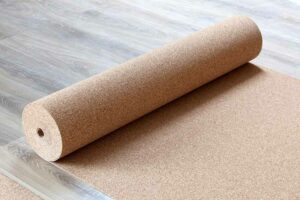
How Does Sound Absorption Work
The fibers in the carpet also help to trap the sound waves, and they can do this effectively up to a certain point. Beyond that point, the sound waves will eventually dissipate and be absorbed by the carpet.
Carpet sound absorption coefficient
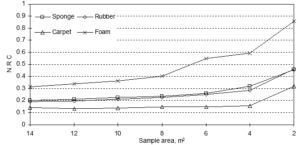
Carpet sound absorption coefficient
Carpet Sound Absorption Coefficient (CSA) is a measure of how effectively a carpet absorbs sound. Carpet manufacturers typically list CSA values for their carpets in order to help consumers choose the right type and size of carpet for their specific room.
How Can You Reduce Noise Levels in Your Home?
Noise in the home can be a nuisance, and it can also be harmful to your health. There are many ways to reduce noise levels in your home, and some of these methods are more effective than others. Here are a few tips:
1. Insulate Your Walls and Ceiling: One of the most effective ways to reduce noise levels in your home is to insulate your walls and ceiling. This will help to block out noise from outside sources, and it will also make the room quieter overall.
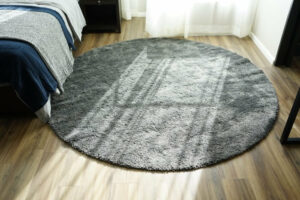
How Can You Reduce Noise Levels in Your Home
2. Install Noise-Cancelling Flooring: Another way to reduce noise levels in your home is to install noise-cancelling flooring.
Are There Any Benefits to Having a Carpet That Absorbs Sound?
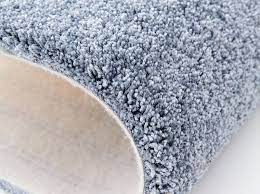
Are There Any Benefits to Having a Carpet That Absorbs Sound
There are a few benefits to having a carpet that absorbs sound. Firstly, it can help to reduce noise levels in the room, making it more comfortable for those who are sensitive to noise. Secondly, carpets can help to keep floors clean and free from debris, which is especially important if you have children or pets in the house. Finally, carpets can also help to protect flooring from damage caused by footsteps and other movement.
The Carpet and Sound Conundrum
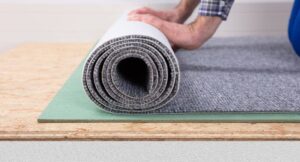
The Carpet and Sound Conundrum
Carpet can be a great noise barrier, but it can also absorb sound. This means that even if you have a carpet that is thick and plush, it may not be effective at blocking noise. In fact, some carpets are specifically designed to trap sound and muffles the sounds of footsteps.
Using a carpet’s acoustic properties to improve working environments
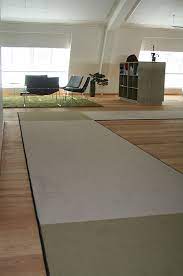
Using a carpet’s acoustic properties to improve working environments
Carpet can absorb sound, making it a potential solution to reducing noise levels in workplaces. The acoustic properties of different types of carpets can vary, so it is important to select the right type for the specific application. Carpeting can also be installed in corridors and other areas where sound travels easily.
Best Types of Carpet For Soundproofing
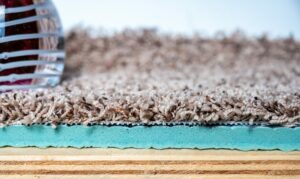
Best Types of Carpet For Soundproofing
There are a few different types of carpets that can be used to help reduce soundproofing noise. Some of the best types of carpets for soundproofing are those made from high-density fiberboard, foam, or hardwood. These types of carpets are good because they absorb sound well and can help to reduce noise levels in a room.
Acoustic carpet backing
Carpet backing is a type of acoustic insulation that is used to reduce sound transmission through floors and walls. The material is made from a variety of materials, including wool, cotton, or paper, and it can be attached to the floor or wall using adhesive or nails.
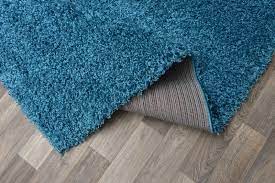
Acoustic carpet backing
Carpet backings are often used in areas where noise levels are high, such as classrooms or offices.
Buying The Right Carpet for Sound Absorption
When it comes to sound absorption, carpet is definitely a big player. Not only do carpets absorb sound, but they also help to deaden noise and make it less disruptive. That said, not all carpets are created equal when it comes to sound absorption. In fact, there are a few things you need to keep in mind when shopping for carpet that will help ensure you get the best possible result.
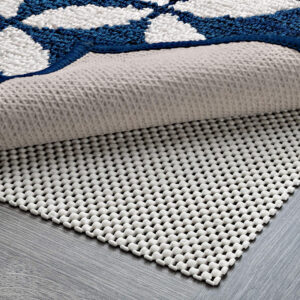
Buying The Right Carpet for Sound Absorption
Surface Construction
Carpet is made up of a number of materials, including a backing layer, pile, and fibers. The backing layer is the most important because it provides support for the pile and fibers. Carpet is usually made from a blend of wool and cotton. Wool is good at absorbing sound, while cotton does not absorb sound as well.
Carpet Material
Carpet material is typically made of a blend of wool and nylon. This blend helps to trap sound and make the carpet quieter when footsteps are taken.
Carpet Underlay
Carpet underlay is a material that is placed beneath the carpeting in order to improve sound absorption. This material can help to reduce noise levels in a room, making it a good choice for areas where noise levels are particularly high.
What Can You Put In A Room To Absorb Sound?
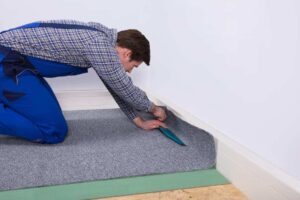
What Can You Put In A Room To Absorb Sound
There are a few things that can be put in a room to absorb sound. Some common items include carpet, pillows, and blankets. Carpet is the most common type of flooring used in homes and businesses. It is often thought that carpets absorb sound, but this is not always the case.
F.A.Q does carpet absorb sound:
Can carpet reduce noise?
Carpet can help reduce noise levels in a room. The material is dense, so it can absorb sound and reduce the amount of noise that is transmitted through the floor. This can be helpful if you are trying to stay quiet while you work or if you live in a noisy environment.
Does carpet help soundproof a room?
Carpet can help to soundproof a room, as it can help to absorb sound. Carpet also has other benefits, such as providing comfort and insulation.
Does carpet absorb sound well?
Carpet absorption can be a topic of debate depending on the individual’s perspective. Some people believe that carpets trap and absorb sound, while others believe that carpets merely reflect sound and do not absorb it. The truth likely falls somewhere in between these two beliefs, as most carpets do both absorb and reflect sound.
What helps absorb sound in a room?
Carpet can help to absorb sound in a room, depending on the type of carpet and its construction. In general, carpets with a higher pile density are better at absorbing sound than those with a low pile density. Additionally, carpet that is made from a high-quality material such as wool or cotton is more effective at absorbing sound than those made from lower-quality materials.
Conclusion
In conclusion, yes, carpets can absorb sound. This can help reduce noise levels in your home and provide some benefits such as comfort and privacy.
And this article Discoverthedinosaurs.com will help you answer the following questions about does carpet absorb sound:
- does carpet absorb sound from neighbours
- does carpet pad absorb sound
- carpet sound absorption coefficient
- soundproof carpet
- carpet acoustic rating
- sound carpet
- sound absorbing rug

